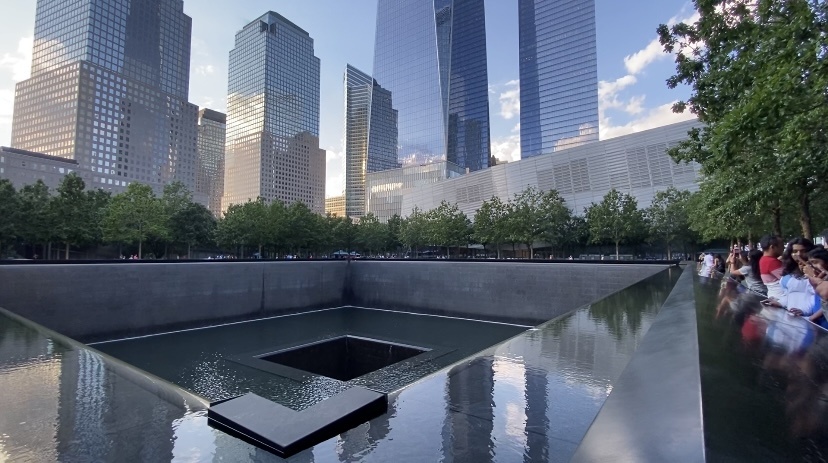9/11 — Have we forgotten?
The U.S. changed on Sept. 11, 2001, when four organized terrorist attacks on the country took place. The attacks destroyed the World Trade Center Twin Towers in New York City and a portion of the Pentagon in Washington, D.C. Nearly 3,000 people were killed.
Steven Weiss was a police officer for the 67th precinct in NYC at the time of the events. He was sent to search the rubble of the Twin Towers the day after the attack and spent 12-hour shifts digging through the destroyed buildings with no days off.
On some days, a group of police officers would be assigned to oversee a post without digging. These officers would take turns sneaking away to chip in and search the rubble.
“Everyone wanted to get down there and start digging and try to find someone,” Weiss said.
Only every once in a while, would he come across a mostly intact item, like a keyboard or binder.
“There’s no way someone could survive this,” Weiss said he would think when he found these irregular items in the pile of ruins.
Tom Scandalito worked in NYC near the Twin Towers at the time of the attack.
“The instructions were crazy,” Scandalito said. “Leave your building, stay in your building. Leave the city, can’t get out of the city.”
He spent all day wandering around, trying to find a way home or somewhere safe. Most public transportation had shut down and there were rumors of bombs on bridges or tunnels.
Not only were the instructions confusing, but it was also difficult to communicate with others. People did not have the same access to mobile devices as today. This lack of access made it more difficult to contact people or share information with the general public as a citizen journalist.
“People didn’t know, in some cases, for days, if their loved ones were okay,” Scandalito said.
At Utah State University, finance and economics professor Craig Petersen, was facing a similar problem.
“It was kind of scary because I had a daughter who was in New York at the time, and the phone lines were blocked,” Petersen said. “It was a while before we could hear from her.”
In New York, friends and family had put up photos of their missing people at the site hoping someone would find their loved one.
“They were still looking for bodies a week later,” Scandalito said. “With every day that passed, hope diminished a little bit.”
Even across the country, there was a wave of shock as the attack unfolded.
Blair Barfuss, the current chief of police at USU, was a rookie cop in the Salt Lake metro area during the attack. He remembers how empty the city was in Utah.
“The streets were dead silent,” he said. “It was almost eerie because not one person was really out. They were all watching TV.”
Paul Johnson and Scott Hunsaker were both employed by USU at the time.
Johnson was getting a cup of coffee in the TSC when he saw the news on the TV screen by the cart. Hunsaker was woken up by a neighbor who told him to check the news.
“It was one of those unbelievable things,” Hunsaker said. “You never forget.”
As time passed, people grew further from their experiences. Most current students at USU have no memory of the events in real time or were not alive during 9/11.
“I feel like every year that passes, I get a little bit more detached from it,” Scandalito said.
Nicolas Engel, a first year student at USU, was not alive during the attacks, but has learned about the attacks in school and through the people impacted.
“I perceive it as history, whereas others perceive it as a traumatic event that they went through,” Engel said.
“It’s hard to view it through the lens of life in 2022 and fully understand the scope of it and how hard it was to comprehend what was going on,” Weiss said.
River McKinlay, a USU senior, was five years old at the time, and remembers the significance of the event while watching TV in his grandma’s living room. He admits the memory may have become warped.
“Since I wasn’t really aware as a kid, it didn’t leave as much of an impact as it would have if I was mature,” McKinlay said.
Barfuss also sees a change in how people act today compared to the community response following the attacks.
“It’s disappointing to see how quickly some of those positive outcomes of 9/11 have disappeared with civility, respect for each other, and patriotism dwindling, and a number of other key factors that lead to the unification of our country,” Barfuss said.
Logan City plans to remember and honor those who died in these attacks. Logan Parks and Recreation and the Church of Jesus Christ of Latter-day Saints will host a park and trail clean-up on Sept. 10. The Cache Community Connections will host an evening remembrance event on Sept. 11.
-Carter.Ottley@usu.edu
Featured photo by Jacee Caldwell

